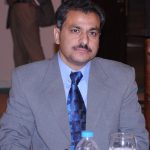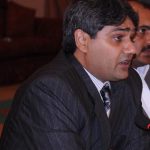Creating an environment that counteracts militant ideologies and radicalism in Pakistan
Ambiguous state policies, incoherent and often conflicting institutional responses, distorted education syllabi, and media’s inability to educate the people are among the factors that have let the perils of extremism and militancy grow in Pakistan. Failure to address these areas and to evolve and implement a comprehensive de-radicalization program in Pakistan would not only strengthen the militants’ ideological narratives in society but also weaken the state’s capacity to counter terrorism and militancy. This was the gist of discussion during a seminar titled “Creating an environment that counteracts militant ideologies and radicalism in Pakistan,” jointly organized by Pak Institute for Peace Studies (PIPS) and Norwegian Peacebuilding Resource Centre (NOREF) in Islamabad on October 11, 2013.
The four sessions of the seminar, including inaugural session, were chaired by former director general Inter Services Public Relations (ISPR) Maj-Gen (retired) Athar Abbas, former inspector general of police (IGP) and interior secretary Tariq Khosa, senior journalist Zahid Hussain and defence analyst Gen (retired) Talat Masood, respectively.
INAUGURAL SESSION
Tariq Khosa said media should be part of the efforts meant to develop a narrative to tackle religious extremism in Pakistan. He described religious extremism as a “mindset” and “a product of faulty policies.” He said “mullah- military nexus” produced militants for proxy wars. It was a way of dealing with issues in a non-conventional way. He said there is a need for a visionary political decision to fight militancy and remove the sense of fear and insecurity among the citizens. He noted that Pakistani state is weak, with lack of institutions and lack of rule of law. “Tackling the militancy is a struggle within Pakistani society. We have to decide whether we want Jinnah’s Pakistan or Zia’s decadence,” he stated.
military nexus” produced militants for proxy wars. It was a way of dealing with issues in a non-conventional way. He said there is a need for a visionary political decision to fight militancy and remove the sense of fear and insecurity among the citizens. He noted that Pakistani state is weak, with lack of institutions and lack of rule of law. “Tackling the militancy is a struggle within Pakistani society. We have to decide whether we want Jinnah’s Pakistan or Zia’s decadence,” he stated.
TV anchor Saleem Safi said media is being used by militants in a tactful way to promote militant ideologies and extremism. He said there are three main reasons for the media’s failure to play a progressive role in conflict reporting:  cultural issues, the media’s internal dynamics and contradictions in the state’s official policy line. In many parts of the country, especially in the conflict zones, journalists face life threats and cannot report issues independently. In the run for rating, most of the time the electronic media puts key national issues on the backburner. In this process, the media is promoting ideas of militancy sometimes without itself knowing the fact. Besides, there are policy confusions and contradictions in state institutions which create confusion even among media persons.
cultural issues, the media’s internal dynamics and contradictions in the state’s official policy line. In many parts of the country, especially in the conflict zones, journalists face life threats and cannot report issues independently. In the run for rating, most of the time the electronic media puts key national issues on the backburner. In this process, the media is promoting ideas of militancy sometimes without itself knowing the fact. Besides, there are policy confusions and contradictions in state institutions which create confusion even among media persons.
Shahzada Zulfiqar, a journalist from Quetta, said journalists should be objective, unbiased and should only provide facts to the people. It is  nonetheless not an easy job particularly for the journalists working in conflict zones including Balochistan where they face threats both from the militants and state institutions including military. He also noted that during the last about two years 28 militant groups were banned in Balochistan but 50 per cent of them were still engaged in propagating their agenda through the media.
nonetheless not an easy job particularly for the journalists working in conflict zones including Balochistan where they face threats both from the militants and state institutions including military. He also noted that during the last about two years 28 militant groups were banned in Balochistan but 50 per cent of them were still engaged in propagating their agenda through the media.
SECOND SESSION
“Mainstream and madrassa education: needs and imperatives for achieving peace and harmony in Pakistan”
Gen (retired) Talat Masood described the gravity of the situation of militancy  and extremism in Pakistan and underscored the need for the state to come up with a comprehensive and coherent policy to deal with it. He was of the view that the government should take leading role in countering militancy and rehabilitating militants which is only possible with a strong political will.
and extremism in Pakistan and underscored the need for the state to come up with a comprehensive and coherent policy to deal with it. He was of the view that the government should take leading role in countering militancy and rehabilitating militants which is only possible with a strong political will.
Safdar Sial, research analyst at PIPS, presented de-radicalization and counter-radicalization approaches and models being used in different parts of world including Saudi Arabia, Egypt, Algeria, Yemen, Morocco, Indonesia,  Malaysia, United States, Norway and Germany etc., and their relevance for Pakistan. He noted that despite their context-specific attributes, these models particularly focused on: countering appeal of militant ideologies; changing attitudes & views; reintegrating militants into society; and using de-radicalized individuals in awareness & education campaigns, public discussions, and counter-narrative programs. He said elements of reconciliation, counseling, dialogue, rehabilitation and reintegration, etc. embedded in a de-radicalization program in Pakistan could provide the space and opportunity to the militants, either detained or at large, to look towards alternatives in life, which are currently largely missing for them.
Malaysia, United States, Norway and Germany etc., and their relevance for Pakistan. He noted that despite their context-specific attributes, these models particularly focused on: countering appeal of militant ideologies; changing attitudes & views; reintegrating militants into society; and using de-radicalized individuals in awareness & education campaigns, public discussions, and counter-narrative programs. He said elements of reconciliation, counseling, dialogue, rehabilitation and reintegration, etc. embedded in a de-radicalization program in Pakistan could provide the space and opportunity to the militants, either detained or at large, to look towards alternatives in life, which are currently largely missing for them.
Qazi Jameel, DIG, National Technical Specialist, KP Police, Peshawar presented a review of Pakistan’s Swat model of militants’ rehabilitation. He  said the Swat model was based on the idea of maintaining the self-respect of the detained individuals so that they disengage from militants. Meanwhile, detainees have imparted education in true Islamic perspective in order to dispel the misperceptions and wrong interpretation of religion they held. Also, the Swat model focused on low-level cadres, which were the backbone of the Taliban army, along with those who had developed mental alignment with the Taliban. In absence of this program, many of them could have assumed of leadership roles.
said the Swat model was based on the idea of maintaining the self-respect of the detained individuals so that they disengage from militants. Meanwhile, detainees have imparted education in true Islamic perspective in order to dispel the misperceptions and wrong interpretation of religion they held. Also, the Swat model focused on low-level cadres, which were the backbone of the Taliban army, along with those who had developed mental alignment with the Taliban. In absence of this program, many of them could have assumed of leadership roles.
Muhammad Amir Rana described challenges, prospects and ways of reintegration and rehabilitation of militants in the perspective of Pakistan’s  diverse militant landscape. For that purpose, he presented four prototypes of militants that offer dissimilar challenges and opportunities. He highlighted specific areas for each prototype where the government could initially intervene. He was of the view that although counter-terrorism and de-radicalization are inter-related they should be studied and dealt with separately.
diverse militant landscape. For that purpose, he presented four prototypes of militants that offer dissimilar challenges and opportunities. He highlighted specific areas for each prototype where the government could initially intervene. He was of the view that although counter-terrorism and de-radicalization are inter-related they should be studied and dealt with separately.

